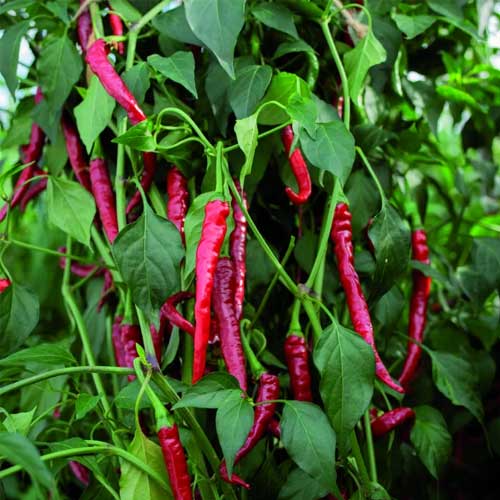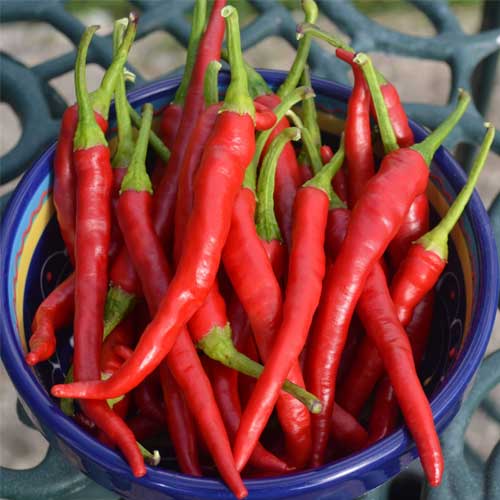Total Number of seeds: 40
Pepper Cayenne Chilli Seeds produce hardy, medium-sized plants that yield slender, dark green peppers with a glossy texture. The fruits are known for their distinct spiciness and versatility, making them perfect for fresh use, drying, or grinding into cayenne pepper powder. Cayenne peppers are a popular choice for adding heat and flavor to dishes, and they mature quickly in just 70-80 days. This variety is easy to grow and suitable for both home gardens and small farms, providing a steady supply of spicy peppers throughout the growing season.


In India, Pepper Cayenne Chilli Seeds are best sown from March to June. These plants thrive in warm, sunny weather and produce long, slender fruits with a glossy finish, perfect for fresh use or drying into cayenne pepper powder.
1. Apply Nutrient-Rich Fertilizers
When your plants begin flowering, use nutrient-rich fertilizers like Organic Bone Meal Powder or Vermicompost. This helps in boosting the bloom and enhances overall yield.
2. Use Organic Fertilizers
Feed your plants with organic fertilizers such as Cow Dung Manure or Neem Cake. Organic options promote healthy soil life.
3. Regular Feeding
Apply fertilizers every 20-25 days to ensure plants receive a steady supply of nutrients. Choose from various options like Cocopeat Compost for moisture retention.
Cayenne Chilli Peppers are known for their slender shape, glossy texture, and strong heat. This variety is a favorite for making cayenne pepper powder and adding a spicy kick to various dishes. The fruits are long and thin, making them ideal for drying and grinding.
Cayenne peppers are rich in capsaicin, which is known for its metabolism-boosting and anti-inflammatory properties. The peppers can be used fresh in salads, salsas, or sauces, or dried and ground into cayenne pepper powder for seasoning. They are also great for adding a spicy kick to stir-fries, soups, and marinades.
When growing Pepper Cayenne Chilli Seeds, ensure the soil is loose and well-draining. Water regularly to keep the soil moist but avoid waterlogging. Monitor for pests and diseases to keep the plants healthy.
Common issues include pests like aphids and diseases like powdery mildew. To prevent these problems, ensure good airflow and use organic pest control methods. Remove affected leaves to avoid disease spread.
Sign in now to receive a 5% instant discount on your first order when using code WELCOME. Begin your organic journey today!
By logging in, you're agreeing to our Terms of Service and Privacy Policy.
Jayesh T
The young plants are picking up strength daily.
Devika N
Bright-looking seedlings formed in all trays.
Aparna Das
Shoots came up fresh and firm.
Kiran Joshi
Germination started quickly in pots and the seedlings look stable.
Mahima S
Leaves look fresh and early stage seems promising.
Tejas Pillai
Sprouts formed evenly across the tray.
Sagar P
Growth seems balanced during the early stages.
Vivek Shelar
Seedlings look neat and bright in color.
Vipin S
Healthy sprouts and leaves look vibrant.
Harsha Menon
Strong seedlings developed well with light watering.